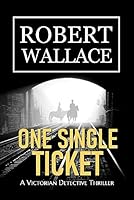Description
One Single Ticket - a Victorian detective thriller It is April, 1852. Victorian Britain's pre-eminent engineer, Isambard Kingdom Brunel, is concerned and perplexed by the distinct lack of progress in his most ambitious scheme to date: his unprecedented vision: London to New York on one single ticket! Some unseen malevolence is at play. Brunel seeks to counteract this by engaging the renowned private investigator, Harry Brooke. Brooke, a former soldier in the British Army, a veteran of the 1842 Afghan Campaign, is summoned to meet Brunel in Bristol. But the railway journey from London is, in itself, not without incident - a death occurs and the investigation takes a more serious and sinister twist. Praise for the Author ( Regarding 'One Single Ticket' )A detective story told at a breathless pace, with a Richard Hannay type hero straight out of a John Buchan thriller, and it goes with a swing, Professor Angus Buchanan, author of 'Brunel: The Life and Times of Isambard Kingdom Brunel' The plot is so interesting, and the setting so well done; a delight to get a scenic picture of this special event in history. Dr. Gabrielle Obrist, Museum of Modern Art, Zȕrich Praise for the Author ( Regarding 'Valentines Cup - WW2 Wartime Spy Thriller' )'Surely this will make a great film!''When war or the threat of war is over there, we care, sure, but then we grab an ale and decide on dinner. When we face an invasion HERE, though, every citizen becomes a bit of a hero. The boy delivering an apple to the old woman next door. The young girl helping to sew blackout curtains. The lorry driver making his or her vital rounds under threat of another bombing run. This is a novel with a hero, or two, but the large picture is that every man and woman had a part to play in preserving the freedom of a country and a continent.''From the start, this story conveys that sense of time and place, blending actual characters from our history with fictional, but wholly plausible, characters. It does not detail the horrors of war; there are no close ups of trauma, so to speak. We have seen enough, I say. A great beauty of Robert Wallace's writing is that those details aren't required. This not to say that the trauma isn't there. It is, but we are placed in a world where wartime is implicit, along with an optimism that simply must exist.''As you read this book, try to imagine what actors could play the lead roles in a major motion picture release. Surely this will make a great film.'Rodney J. Little, W. E. Little Company, Charlotte, NC


 Amazon UK
Amazon UK